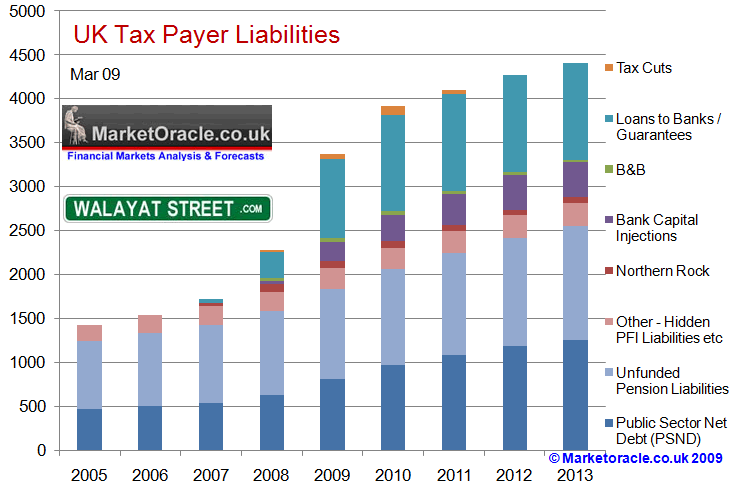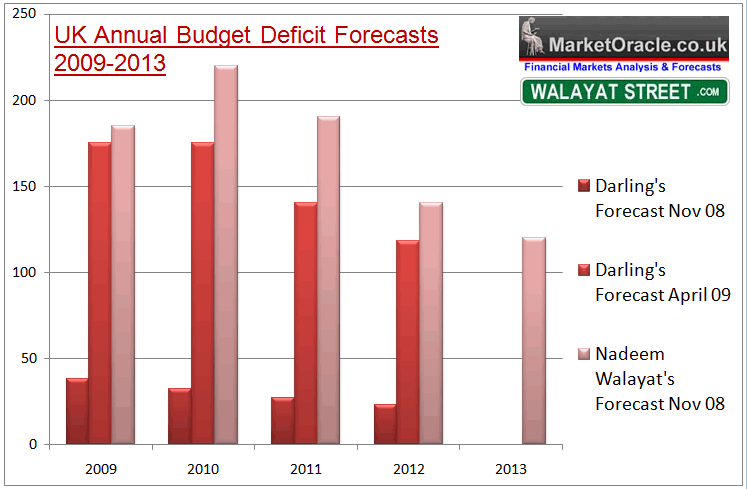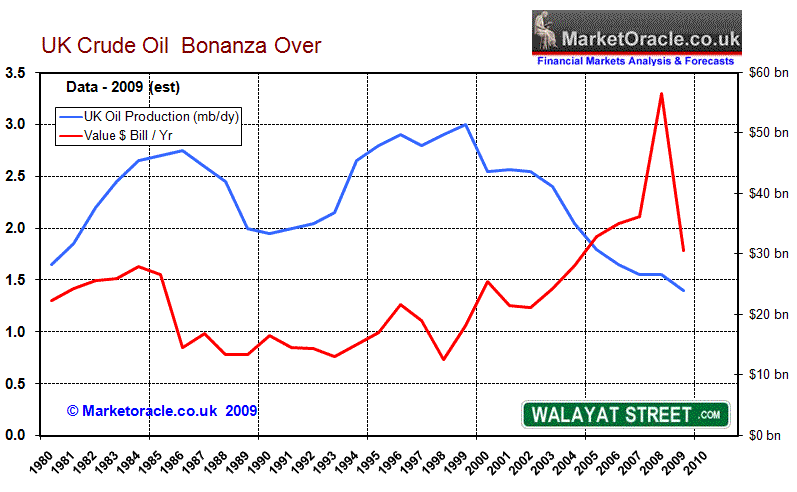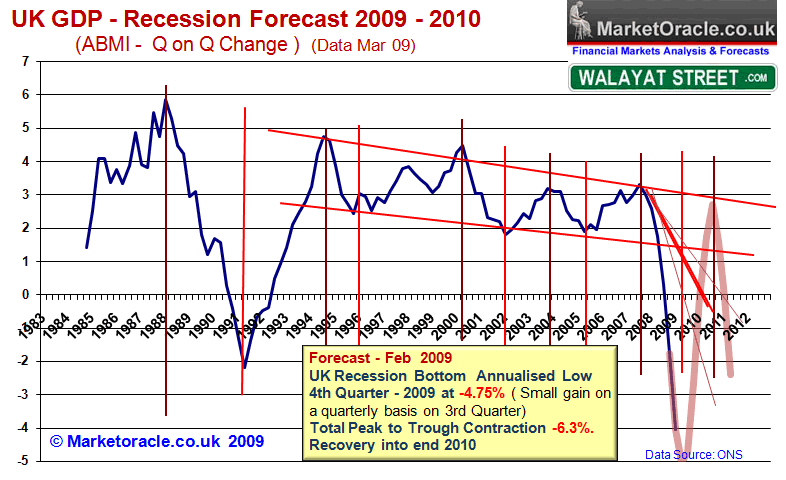Public Sector Pensions Deficit of £1.2 trillion Adds to Britains Debt Crisis
Economics / UK Debt Jun 29, 2009 - 02:20 AM GMTBy: Nadeem_Walayat
 The mainstream press is widely reporting that the public sector pensions deficit has now grown to £1.2 trillion, standing at 85% of GDP which is more than triple that of the United States as stated in a report by the British-North American Committee :
The mainstream press is widely reporting that the public sector pensions deficit has now grown to £1.2 trillion, standing at 85% of GDP which is more than triple that of the United States as stated in a report by the British-North American Committee :
The Governments of the UK, US and Canada are understating significantly the true cost of their employees’ pension costs in terms of both the liabilities already incurred and the annual cost of running their public sector schemes. In the UK, where unfunded schemes predominate, public sector pension liabilities are £1,177 billion, about £20,000 for every person in the UK, equivalent to 85% of GDP, a percentage three times as high as in North America.
These findings are in a study The need for transparency in public sector pensions, published today by the influential British- North American Committee (BNAC)1. In the US and Canada, where the majority of public sector schemes are now funded (i.e. a ‘real’ fund is being built up to meet all or some of the cost of anticipated future pension liabilities), the position is somewhat better. In the US, whilst the net liabilities of public sector schemes are higher at around £2,700 billion2, this equates to ‘just’ 28% of GDP. In Canada, liabilities are under £250 billion, equating to around 27% of GDP.
Leaving aside that there is an apparent error in the figures in that £1,177 billion is now nearer to 95% of GDP than the stated 85%, given the fact that the UK Economy has by now contracted by more than 5%. The public sector pensions deficit of £1,177 billion for 2009 is considerably higher than my own estimate of £810 billion as of November 2008, which adds nearly £400 billion to Britains debt mountain that threatens a decade of economic stagnation as a consequence of high inflation and interest rates under the weight of servicing a huge growing debt mountain.
If the data presented by the British-North American Committee turns out to be accurate, this will therefore increase Britians exploding debt burden by more than 10% as illustrated by the existing estimate of end 2009 debt and liabilities of £3,555 billion which now projects to £3,916 billion.

The huge annual budget deficit of more than 12% ensures that the debt burden will continue increasing into 2015, which demands extreme measures in the form of deep public sector spending cuts in an attempt to bring Britains finances back under control as the consequences of not doing so could result in a lost economic decade much as Britain experienced during the 1970's.
At this point in time I just cannot see any way out for Britain from a severe period of economic stagnation, as the country is hit by the double whammy of losing both of its cash-cows of the past 30 years, namely North Sea Oil and the Banking Sector profits. As regardless of the Conservative party hype of Thatcherism saving the country during the 1980's, the fact of the matter is that it was huge revenues from North Sea oil of more than $25 billion per year, a squandered windfall that financed the Thatcherite revolution during the 1980's, that coupled with the Big Bang in the City which ignited the mother of all credit booms which we have witnessed the deleveraging of during the past 2 years.

North Sea oil production passed its peak in 2001/2002 with each subsequent year set to result in diminishing tax revenues despite the temporary blip of 2008 due to the speculative boom that took crude oil to $150. That coupled with the loss of tax revenues from the the banking sector's ponzi profits leaves a huge hole in the countries budget due to the Labour governments lack of control on public spending that has seen spending departments such as the NHS more than triple their budgets with barely 1/10th of the extra spending filtering through to increased output.

The UK economy is set for a recovery into 2010, as we are starting to see in several economic indicators such as the housing market, however the economic recovery which is built on debt for election purposes will not be sustainable, if anything today's news of another £400 billion of extra public sector pensions liabilities just puts another nail in the economic coffin that is suggestive of a second more severe recession that will soon follow the next general election forecast for May 2010. The only real solution to Britians debt crisis is to spend within its means which means severe public spending cuts, far more that which any politician is willing to admit to at this point in time. We are perhaps talking a cut of £100 billion a year or 14%. That coupled with reform of the public sector pensions to bring them inline with the private sector rather than the current disparity that threatens bankruptcy of the country.
For More on Britains Path to Bankruptcy see recent analysis -
- 11 Jun 2009 - Bankrupt Britain's Public Sector Double Dip Debt Recession on Deep Spending Cuts
- 03 Jun 2009 - UK Economy Set for Debt Fuelled Economic Recovery Into 2010 General Election
- 31 May 2009 - Labour Governments Bankrupt Scorched Earth UK Economy for the Conservative Government
- 14 May 2009 - UK House Prices Bottom or Temporary Summer Bounce?
- 03 May 2009 - Privatise the NHS and Save the UK Economy from Bankruptcy
- 01 May 2009 - Labour Government Enslaves the British Tax Payer to a Decade of Paying for the Bankers Crimes
- 23 Apr 2009 - Darling's Recession Debt Crisis Budget, Britain's £1.2 Trillion Public Sector Black Hole
By Nadeem Walayat
http://www.marketoracle.co.uk
Copyright © 2005-09 Marketoracle.co.uk (Market Oracle Ltd). All rights reserved.
Nadeem Walayat has over 20 years experience of trading derivatives, portfolio management and analysing the financial markets, including one of few who both anticipated and Beat the 1987 Crash. Nadeem's forward looking analysis specialises on the housing market and interest rates. Nadeem is the Editor of The Market Oracle, a FREE Daily Financial Markets Analysis & Forecasting online publication. We present in-depth analysis from over 250 experienced analysts on a range of views of the probable direction of the financial markets. Thus enabling our readers to arrive at an informed opinion on future market direction. http://www.marketoracle.co.uk
Disclaimer: The above is a matter of opinion provided for general information purposes only and is not intended as investment advice. Information and analysis above are derived from sources and utilising methods believed to be reliable, but we cannot accept responsibility for any trading losses you may incur as a result of this analysis. Individuals should consult with their personal financial advisors before engaging in any trading activities.
Nadeem Walayat Archive |
© 2005-2022 http://www.MarketOracle.co.uk - The Market Oracle is a FREE Daily Financial Markets Analysis & Forecasting online publication.



